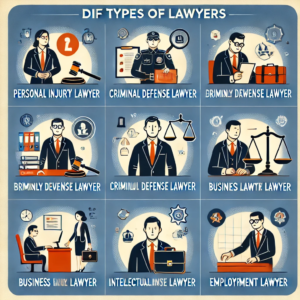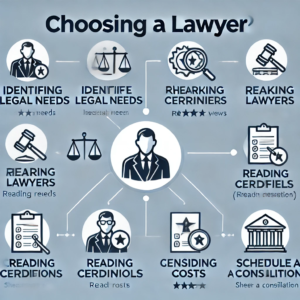Learn about different types of lawyers, their roles, and how to choose the best attorney for your legal needs. Essential tips for hiring a lawyer.
Understanding Lawyers: A Guide to Legal Services
Legal matters can be complex, and having the right lawyer can make all the difference. Whether you need assistance with personal injury claims, business disputes, or criminal defense, understanding the role of a lawyer is crucial.

What is a Lawyer?
A lawyer is a licensed professional who provides legal advice and represents clients in legal matters. They help individuals and businesses navigate laws, draft contracts, and defend cases in court.

Types of Lawyers
There are several types of lawyers, each specializing in different legal fields:
- Personal Injury Lawyer – Handles cases related to accidents, medical malpractice, and workplace injuries.
- Criminal Defense Lawyer – Defends individuals accused of crimes.
- Family Lawyer – Specializes in divorce, child custody, and adoption.
- Business Lawyer – Assists with business formation, contracts, and legal compliance.
- Intellectual Property Lawyer – Protects patents, copyrights, and trademarks.
- Employment Lawyer – Deals with workplace disputes and labor laws.
Why You Need a Lawyer
- Legal Representation – A lawyer ensures your rights are protected in legal proceedings.
- Expert Advice – Lawyers provide guidance on contracts, lawsuits, and disputes.
- Avoid Costly Mistakes – Legal errors can be expensive. A lawyer helps prevent such mistakes.
- Court Representation – If a case goes to court, an attorney presents a strong defense or claim.

How to Choose the Right Lawyer
Finding the right lawyer is essential for a favorable outcome. Follow these steps:
1. Determine Your Legal Needs
Different cases require different expertise. Choose a lawyer specializing in your legal issue.
2. Check Credentials and Experience
Verify the lawyer’s qualifications, licenses, and experience in handling similar cases.
3. Read Reviews and Testimonials
Online reviews and client testimonials can provide insights into a lawyer’s reputation.
4. Consider Costs and Fees
Understand the lawyer’s fee structure, whether it’s hourly, contingency-based, or a flat fee.
5. Schedule a Consultation
A consultation allows you to assess communication, transparency, and legal strategy.
Common Legal Mistakes to Avoid
- Not Seeking Legal Help Early – Delaying legal advice can worsen the situation.
- Signing Contracts Without Review – Always consult a lawyer before signing legal documents.
- Representing Yourself in Court – Legal expertise is crucial for a strong defense.
Useful Legal Resources
- Find a Lawyer
- Legal Rights and Responsibilities
- Understanding Court Procedures
- American Bar Association
- FindLaw Legal Directory
Conclusion
Hiring the right lawyer ensures you receive proper legal representation and guidance. By understanding your legal needs, researching attorneys, and avoiding common legal mistakes, you can make informed decisions. Seek professional legal assistance for the best outcomes.
Frequently Asked Questions (FAQs)
Q1: When should I hire a lawyer?
Hire a lawyer when facing legal disputes, drafting contracts, or dealing with criminal charges.
Q2: How much does a lawyer cost?
Fees vary based on experience, location, and case complexity. Some offer free consultations.
Q3: Can I change my lawyer during a case?
Yes, but it may affect the case timeline and cost. Consult before making a decision.